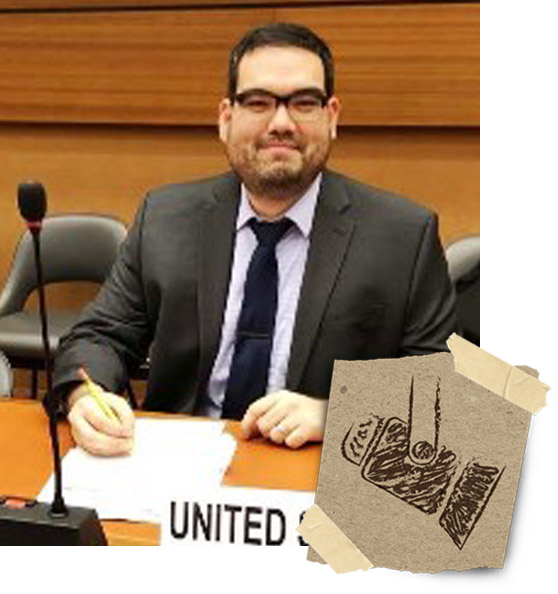College Shines Diversity Spotlight on GEO Alumnus Anthony Knapp
May 31, 2022 - Liz Schondelmayer
 In 2020, the United States Census Bureau estimated that over seven percent of the American population identifies as at least partially Asian American. One of the people whose work has produced that statistic is Anthony Knapp, a Michigan State alumnus with a knack for population knowledge.
In 2020, the United States Census Bureau estimated that over seven percent of the American population identifies as at least partially Asian American. One of the people whose work has produced that statistic is Anthony Knapp, a Michigan State alumnus with a knack for population knowledge.
Knapp graduated from Michigan State University in 2009 with a Master's degree in Geography, Environment and Spatial Sciences and a specialization in Global Urban Studies. After an undergraduate study abroad trip to Beijing, China, Knapp discovered he had an interest in Asian studies as well as urban planning, and found that MSU could allow him to pursue both of his passions.
Under the direction of Dr. Igor Vojnovic, who now serves as the interim director for the Global Urban Studies Program, Knapp's thesis research focused on Asian American immigrant neighborhoods in the United States.
"For my master’s thesis, I did fieldwork in Houston, TX studying neighborhood change in Chinese and Vietnamese business districts and documenting how cities can enhance or impede investment into economically disadvantaged neighborhoods and implications this has on displacing residents and local businesses," Knapp explained.
Now, Knapp serves as a demographer for the United States Census Bureau, where he works as a researcher, code programmer and data analyst looking at yearly population estimates and demographic characteristics of Asian American migrant communities. Although he is no longer in academia, Knapp credits his MSU education for gaining the skills he has used to excel in his current career.
"Although I ended up in a very applied profession, I cannot overstate how important the research and graduate seminars were in preparing me for my career," he reflected. "In addition to honing my critical thinking and writing skills, they also prepared me on how to communicate to a wide variety of audiences."
"My master’s program also strongly encouraged coursework on statistical methods and geographic information systems, and my thesis research forced me to become proficient with Census data and statistical analysis, which helped prepare me for my career at the Census Bureau."
One of his favorite parts of his job is providing free, accessible data to the public - data which is also used by various governmental entities, organizations and committees at the local, state and federal level. This helps determine voter representation and informs policy decisions impacting different populations.
A key topic that Knapp studies in his role are the people that are coming into the United States - as well as those who choose to leave the country. His research in this area started around 2013 when he and his colleagues discovered that the number of Chinese and Indian immigrants coming into the U.S. had surpassed the number of people coming in from Mexico.
"I led a follow-up study in 2014 confirming this trend, and our work was picked up by a number of major media outlets at the time, as this marked an important transition in U.S. immigration. Mexico had been the single biggest sending country of recent migrants to the U.S. for quite some time, up until the Great Recession," Knapp explained.
Knapp is also interested in understanding international student migration, and why some students choose to stay in the U.S. while others choose to return home to their country of origin. His research on this topic was presented to the United Nations in Geneva, Switzerland.
"Unfortunately, it’s not an easy question to answer given the lack of available, current, and nationally comprehensive information out there, especially on people who voluntarily return to their home country," said Knapp. "This is something my staff and I are always grappling with. In the U.S. context, and I imagine for many other countries too, the emphasis seems to be more on who are coming to the U.S., but it should be reasonable to consider who are leaving too."
At the center of Knapp's work is an emphasis on the importance of diversity, equity and inclusion. As a biracial Korean American and son to an immigrant parent, Knapp knows the importance of understanding and respecting others' lived experiences.
"My personal experiences have driven me to advance DEI in my everyday work. This really makes me aware that we all come from different backgrounds, so I try to create opportunities for the people around me to showcase their experiences," Knapp reflected.
"One of the big positives at my job, and living where I am now, is the incredible diversity in people who are my neighbors and my coworkers. I’ve also worked and lived in places where the opposite is true. I think inherently DEI work is important, especially as our country’s population continues to change, we need to place importance on DEI."

